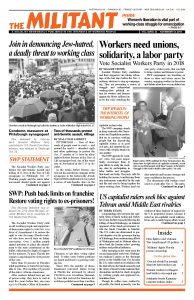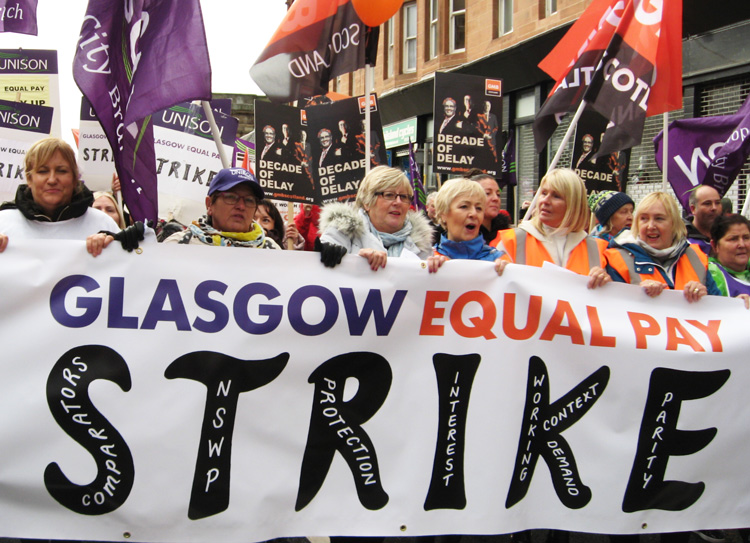GLASGOW, Scotland — Chanting “What do we want? Equal pay. When do we want it? Now!” Some 8,000 workers, mainly women, marched here Oct. 23 on the first day of a two-day strike. School cleaners, cooks and teaching assistants, home-care workers and others — members of Unison and GMB trade unions — were striking to demand Glasgow City Council, their boss, pay them for years of being paid less than workers in predominantly male jobs. There are workers like them all across the country.
The day started with lively and well-attended picket lines throughout the city. Hundreds of primary schools and nurseries were shut down.
As the marchers made their way to George Square, bus and other drivers blew horns in support. Other workers left their jobs and lined the streets applauding. Bridget Farren, a social care worker and Unison member not on strike, joined the rally on her lunch break. “If we’re divided it’s harder to fight,” she told the Militant. “We all need to stand together.”
“This is a fight for all,” said Kevin Connolly, a Unison member at a school support center. “We have a common enemy in the council executive.”
The cleansing department — 600 street sweepers, refuse collectors and road workers, mainly male members of the GMB — refused to cross picket lines, bringing work to a halt for two days. The council threatened legal action against the union.
Long-running battle
The dispute over equal pay is a long-running fight. Last year the Court of Session, Scotland’s highest civil court, ruled in favor of women workers who had argued that both the council’s 2006 Workforce Pay and Benefits Review and the previous pay structure discriminated against women. The 2006 review supposedly eliminated unequal pay, and was signed off by union officials.
But it didn’t stop pay discrimination. Workers contracted for more than 37 hours a week qualified for higher pay. While women make up 70 percent of the council workforce, the vast majority works less than 35 hours. The pay differential is around £3 per hour ($3.85).
Because of union endorsement of the pay review, thousands of women were forced to turn to the courts, demanding they get the higher rates and back pay as well. “I first made a claim for equal pay in 2006,” Ann Walker, a member of the GMB, told the Militant. “I have two jobs to make a living, both with the council — as a classroom assistant at St Joseph’s Primary School and at a special needs school. If I had equal pay, I’d only need one.” Many other women described having to work two or even three jobs.
The previous Labour Party-controlled city administration fought workers in the courts. Last year the Scottish National Party won control of the council, in part because they pledged to settle the dispute. But 10 months of talks and 21 meetings have failed to produce a settlement.
The fight in Glasgow is part of a broader picture of challenges to second-class pay rates for women throughout the U.K. Many other local councils have been forced to settle. In Birmingham, women workers won a payout totaling £1 billion. Another legal challenge could affect 200,000, mainly female, Tesco supermarket workers. Similar actions are underway against Sainsbury’s and Asda supermarkets.
The Equal Pay Act became law in the U.K. in 1970, a direct result of a 1968 strike by women workers at Ford Motor Company. But the pay gap remains today, although it has narrowed.
The Glasgow strike is being closely watched by workers and bosses alike.
At the rally, striker after striker got up to tell their stories.
Janice Robertson, a Support For Learning worker, said, “They dangled a carrot in front of us 12 years ago, then they withdrew it and said they would negotiate. Now they want to dangle the carrot again. We’re here to say that carrots are for donkeys.”
Supporters of the Militant went door to door in the working-class Polmadie area after the rally. Every worker we spoke to backed the strike. “I’m with the strikers all the way,” Joe McTeer, a private-hire cabbie, said. Pointing to coverage in the Militant of Uber drivers’ protests in London, he added, “Taxi drivers need to stand together too.”


